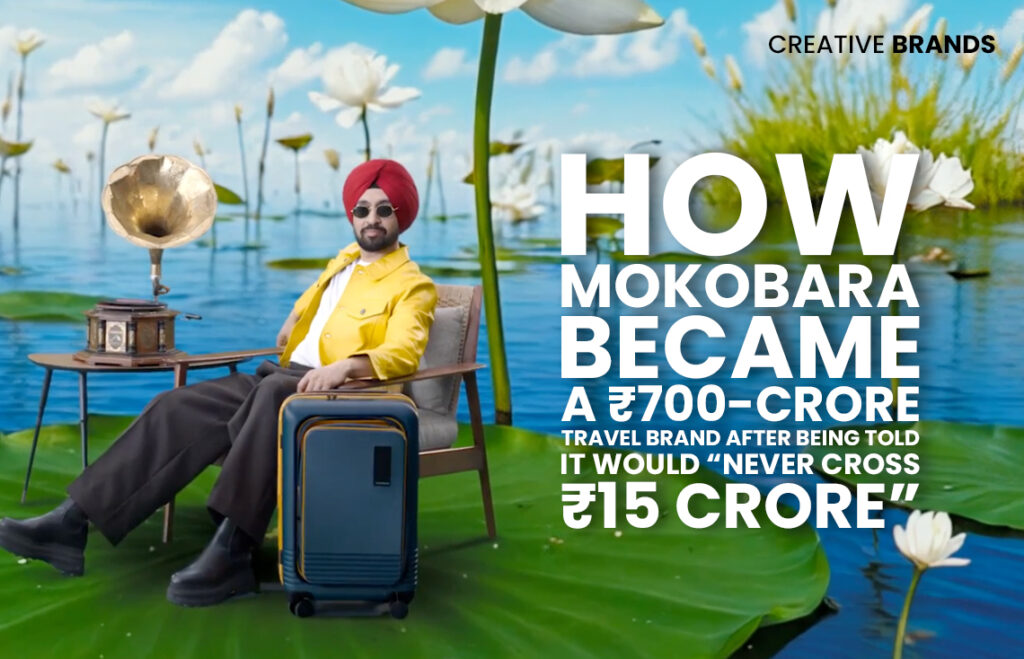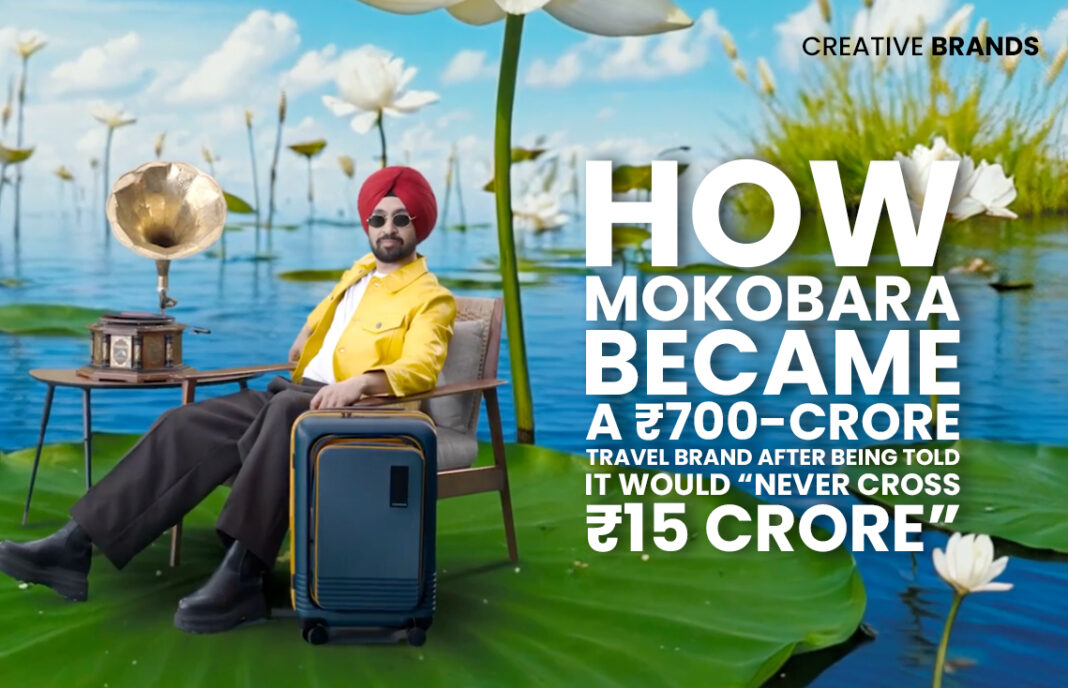Dismissed early by industry veterans, Mokobara has grown from selling 200 bags a month in 2020 to a ₹700-crore premium luggage brand. By betting on world-class design, a D2C-first strategy, and product-led differentiation, founders Sangeet Agrawal and Navin Parwal built one of India’s fastest-growing travel brands amid skepticism and a pandemic.

When Sangeet Agrawal and Navin Parwal debuted their final prototype in late 2019 to one of India’s most seasoned luggage industry veterans, the verdict was dismissive enough to crush most early entrepreneurs. “At max, you’ll do ₹15 crore in your lifetime,” he told them after examining the sleek, premium-looking suitcase that would eventually reshape India’s luggage market. His second, more stinging question followed immediately: “Who will buy such a costly product?” For many founders, that kind of expert opinion would have signaled the end of the road. But for Agrawal and Parwal, it confirmed something else entirely—that the industry was stuck in a mindset that no longer matched the aspirations of modern Indian travelers.
That same prototype became the foundation of Mokobara, a brand that today stands tall at a valuation of roughly ₹700 crore and is one of India’s fastest-growing premium travel brands. But the journey to this point was anything but guaranteed. In a market long dominated by legacy companies selling functional, modestly designed luggage, Mokobara bet everything on a bold hunch: Indian consumers weren’t just ready for better—they were ready for beautiful, thoughtfully crafted travel companions that elevated the experience rather than merely served it.
From the beginning, the founders made a decision that baffled many around them. Instead of building the product entirely in India or following category conventions, they hired Morrama—an award-winning, certified B-Corp design agency based in London—to craft their first range of luggage. It was an unusual choice, especially for a young Indian startup still proving itself. WHY hire a global design firm for a product intended for Indian buyers? Why spend on aesthetics and innovation in a category where functionality historically dominated?
But this design-first philosophy soon became Mokobara’s defining edge. Together with Morrama, the founders obsessively rethought every inch of the bag. They chose Japanese Hinomoto wheels known for their gliding precision. They added a signature yellow interior lining that made each unzipping moment distinctive. And they embraced a Swedish design principle—“not too much, not too little”—to strike the perfect balance between minimalism and personality. In an industry where most luggage options looked nearly identical, Mokobara felt fresh, global, premium, and unmistakably intentional.
In January 2020, after months of design iteration and quiet conviction, Mokobara officially launched as a pure direct-to-consumer brand. Their expectations were modest. Their goals, methodical. The market response? They sold 200 bags in the very first month—strong for a premium newcomer, but still a whisper compared to what was ahead.
Then, the pandemic hit. Flights stopped. Travel froze. Suitcases gathered dust across the world. For most luggage companies, the following months were catastrophic. For a young startup barely weeks old, it seemed fatal. Many observers concluded that Mokobara had launched at the worst possible moment. How could a travel-focused brand survive when the world itself had paused?
But what unfolded next was a testament to the brand’s sharp instincts and the founders’ resilience. Instead of shutting down or shrinking operations, they doubled down on listening to customers, refining product lines, and preparing for the rebound they believed would come. And when travel began to resume—slowly at first, then rapidly—Mokobara was ready in a way few competitors were.
From selling 200 bags monthly in early 2020, the brand now ships more than 35,000 bags every month. In FY24, they crossed ₹117 crore in revenue. Today, they are running at an annualised revenue rate of nearly ₹200 crore—a number that signals not just recovery but dominance in a category once thought too dull for disruption.
Investment soon followed. Deepika Padukone, one of India’s most influential global stars, became an investor, adding both credibility and cultural cachet to the brand. Peak XV Partners (formerly Sequoia India) led their Series B funding round. To date, Mokobara has raised more than $12 million, fueling both its retail expansion and its product innovation pipeline.
But perhaps the most unconventional part of Mokobara’s rise was the founders’ initial refusal to partner with India’s major retail chains. Every major retailer wanted the brand on its shelves. Most Indian startups would have rushed to sign these deals for exposure and footfall. Instead, Mokobara said no. Their reasoning was simple: they had built a brand rooted in direct relationships with customers, and they weren’t ready to compromise that identity through traditional retail environments. Only after establishing undeniable demand and loyalty did they selectively expand offline. Today, they operate over 20 stores—but on their own terms.
Mokobara’s story offers lessons that stretch far beyond luggage. It challenges assumptions about what Indian consumers want and what Indian founders can build. It proves that design differentiation can transform even the most “boring” categories. It demonstrates that premium positioning can work in India—not only in the metros, but across the country—if the product truly delivers. And it validates the idea that sometimes the smartest strategy is to grow slowly, with precision, before scaling widely.
The brand’s philosophy also reflects the evolving aspirations of young Indian travelers. They don’t just want bags that carry things. They want bags that carry identity, taste, and lifestyle cues. In a world where airport photos are shared as often as holiday ones, luggage is no longer just a utility—it’s an accessory, a statement, even a form of self-expression. Mokobara understood this before the market data showed it. They built for that future when most others were still designing for the past.
The luggage veteran who dismissed their early prototype predicted they would make, at most, ₹15 crore in their lifetime. Today, Mokobara is a ₹700 crore brand—and still accelerating. The industry expert was wrong not by a small margin, but by more than ₹185 crore and counting.
For Agrawal and Parwal, the numbers matter, but what matters more is what those numbers represent—an Indian brand standing tall on the global design stage, proving that modern Indian consumers value craftsmanship, aesthetics, technology, and storytelling. Mokobara didn’t just redesign luggage. They redefined what a travel brand from India could look like.
Their journey is a reminder to founders everywhere: the world’s most transformative ideas often begin with someone telling you they’ll never work.
Discover more from Creative Brands
Subscribe to get the latest posts sent to your email.






